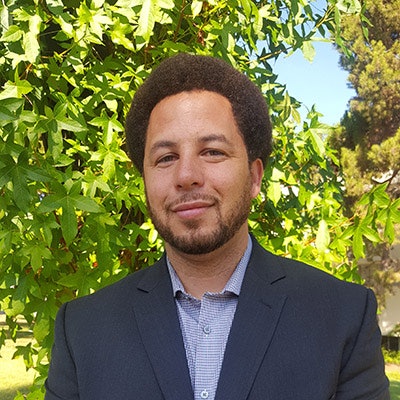Growing up in the small town of McCloud, California, Dr. J. Luke Wood became interested in higher education after noticing the lack of diversity in the faculty and administration during his undergraduate years at the California State University, Sacramento.
 Dr. J. Luke Wood
Dr. J. Luke Wood“There were too few people, Black faculty of color, staff of color, administrators of color, who were there advocating and representing our communities and providing a different type of perspective on what directions the institutions needed to go,” says Wood, who is the Distinguished Professor of Education at San Diego State University. “My involvement and entry into the academy was really a response to that and wanting to be the person to set the different paradigm.”
Formerly the director of the joint Ph.D. program in Education between San Diego State University and Claremont Graduate University and director of the Ed.D. program in Community College Leadership, Wood was recently appointed associate vice president for faculty diversity and inclusion at San Diego State University (SDSU), a move he made in support of the university’s new president and provost’s vision “around diversification.”
In this new position, Wood will work with SDSU faculty and administrators to create a diverse and inclusive culture that supports professional success. As the university’s chief diversity officer, he will work closely with the administration to ensure that diversity and inclusion goals are met.
“I’m excited to be working for a great president and provost who are committed to ensuring that San Diego State honors its identity as a Hispanic Serving Institution (HSI) and advances equity for students, faculty, staff and administration,” he says.
Outside of SDSU, Wood is the co-director of the Community College Equity Assessment Lab (CCEAL), a national research center that partners with about 150 colleges across the country to collect data about their students.
Wood’s counterpart is Dr. Frank Harris III, professor of postsecondary education at SDSU.
Wood, according to Harris, is “one of the hardest working people” he’s ever met and says that collaborating with the educator is “truly like working with a creative genius. It’s like going to work with George Lucas or Steve Jobs, somebody who just kind of has out-of-the-box ideas,” adds Harris.
After graduating with a degree in Black history and politics and a master’s degree in student affairs and early childhood education, Wood earned a Ph.D. in higher education from Arizona State University.
His research focuses on factors affecting the educational success of boys and men of color, particularly for those enrolled at community colleges. Wood’s scholarship has provided him with the opportunity to “be reflective of my own experiences” and “advocate for my community,” he says.
“Often times we find that, in particular, Black, Latino and Southeast Asian males will fall below where they should be,” he says. “Some people rationalize that as being specific to the students, their families and their communities. We see it more from the perspective that many educators are simply not prepared to engage them and simply don’t do so from the perspective that would actually benefit their success,” he adds.
Currently, Wood is working on a project with his educator wife, Idra, who is also on the SDSU faculty. The project examines how Black boys’ microaggressions and early childhood education experiences shaped their learning and development, focusing on messages around criminality and a lack of intelligence, Woods says.
A dedicated and tireless worker, Wood has received several awards recognizing his achievements, such as the 2017 Faculty in Residence Award from the Division J Emerging Scholars Program of the American Educational Research Association and 2016 Co-Recipient of the Educational Partnership Award from the African-American Male Education Network and Development (A2MEND).
The best thing about working in academe, he says, is the ability to have an impact on others.
“We’ve been able to partner with institutions and help them and supporting them in transforming themselves,” says Wood. “And being able to walk in that journey with colleges as they try to become more equity-minded is pretty inspiring.”
Wood has authored and edited 14 books, most recently the texts titled Supporting Men of Color in the Community College, Teaching Boys and Young Men of Color and Teaching Men of Color in the Community College.
Wood says that he is inspired by the many students that he encounters on a daily basis.
“There’s nothing more powerful than sitting down and just having conversations or interviews with students and hearing about their experiences and knowing that a lot needs to be done and how we might not have all of the answers, but we do have some of them,” he says. “And being able to bring that process to bear and help to change their institutions, I mean, if we’re not in education to support our students, then what are we here for?”
Monica Levitan can be reached at [email protected]. You can follow her on Twitter @monlevy_.
This article appeared in the September 20, 2018 edition of Diverse. This is the final in a series of profiles about distinguished professors of education.















